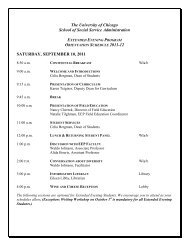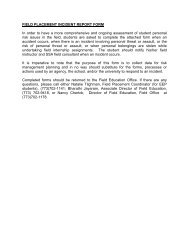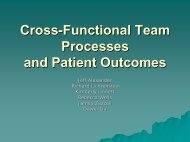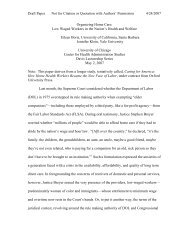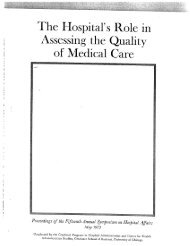DEFINING PROBLEMS. SHAPING SOLUTIONS . - School of Social Service ...
DEFINING PROBLEMS. SHAPING SOLUTIONS . - School of Social Service ...
DEFINING PROBLEMS. SHAPING SOLUTIONS . - School of Social Service ...
You also want an ePaper? Increase the reach of your titles
YUMPU automatically turns print PDFs into web optimized ePapers that Google loves.
a d v o c a t e s ’ f o r u m<br />
Community benefits agreements have emerged in both form and<br />
function as the result <strong>of</strong> a particular set <strong>of</strong> historical circumstances.<br />
Understanding this history <strong>of</strong>fers an important corrective to thinking <strong>of</strong><br />
CBAs as an ahistorical phenomenon or as a neutral development tool.<br />
Locating CBAs in this historical context illuminates the logic behind<br />
the form they have taken and the functions they have performed. This<br />
understanding, in turn, underscores consequences <strong>of</strong> the prevailing<br />
urban political economy and suggests how CBAs may contribute to the<br />
reconstitution <strong>of</strong> urban power dynamics and modes <strong>of</strong> governance.<br />
Community coalitions have worked for CBAs during an era <strong>of</strong><br />
neoliberal metropolitan governance characterized by selective preference<br />
for free markets, inhibited redistributive investment in low-income<br />
communities, heightened competition to attract private capital, and public<br />
expenditure on development projects targeted at the immediate benefit<br />
<strong>of</strong> relatively high-income businesses and people (Abu-Lughod 1999;<br />
Gotham 2001; Harvey 1989; Harvey 2005, 87; Peck 2005). Scholars have<br />
characterized urban economies <strong>of</strong> this era as “post-Fordist” and “flexible”<br />
partly in reference to the replacement <strong>of</strong> stable manufacturing jobs with<br />
tenuous, frequently temporary, and low-paying service-sector work and an<br />
associated increase in unemployment (Harvey 1989). That CBAs function<br />
as a redistributive tax on private capital in order to provide well-paying<br />
jobs to local residents and to compensate for locally incurred negative<br />
externalities attests to their place in this post-Fordist and neoliberal urban<br />
economy. That they take the form <strong>of</strong> contracts between civil- and privatesector—and<br />
even sometimes public—parties accords with the neoliberal<br />
molding for “market-based” solutions.<br />
Considering CBAs in their historical context facilitates the conclusion<br />
that they are, at most, a second-best strategy for promoting balanced<br />
urban growth through investment in low-income communities. Historical<br />
accounts suggest that the decisions <strong>of</strong> government <strong>of</strong>ficials in recent decades<br />
have created narrow channels <strong>of</strong> possibility for urban development projects,<br />
and that these channels have shaped both the impetus and opportunity for<br />
residents to organize for CBAs. At the same time, the act <strong>of</strong> organizing and<br />
sustaining CBA coalitions has coalesced previously nonexistent—or at least<br />
inchoate—power. Through CBA processes, coalitions have used this power<br />
to promote economic benefit for low-income city residents and to perform<br />
environmental and labor-related regulatory functions in the absence <strong>of</strong><br />
government intervention. In doing so, CBAs and the coalitions organized<br />
to create them encourage re-imagination <strong>of</strong> the current urban political<br />
economy. By creating space in urban development discourse and practice for<br />
the concerns <strong>of</strong> their communities and by demonstrating tangible outcomes<br />
in the void left by government inaction, community coalitions expansively<br />
29






